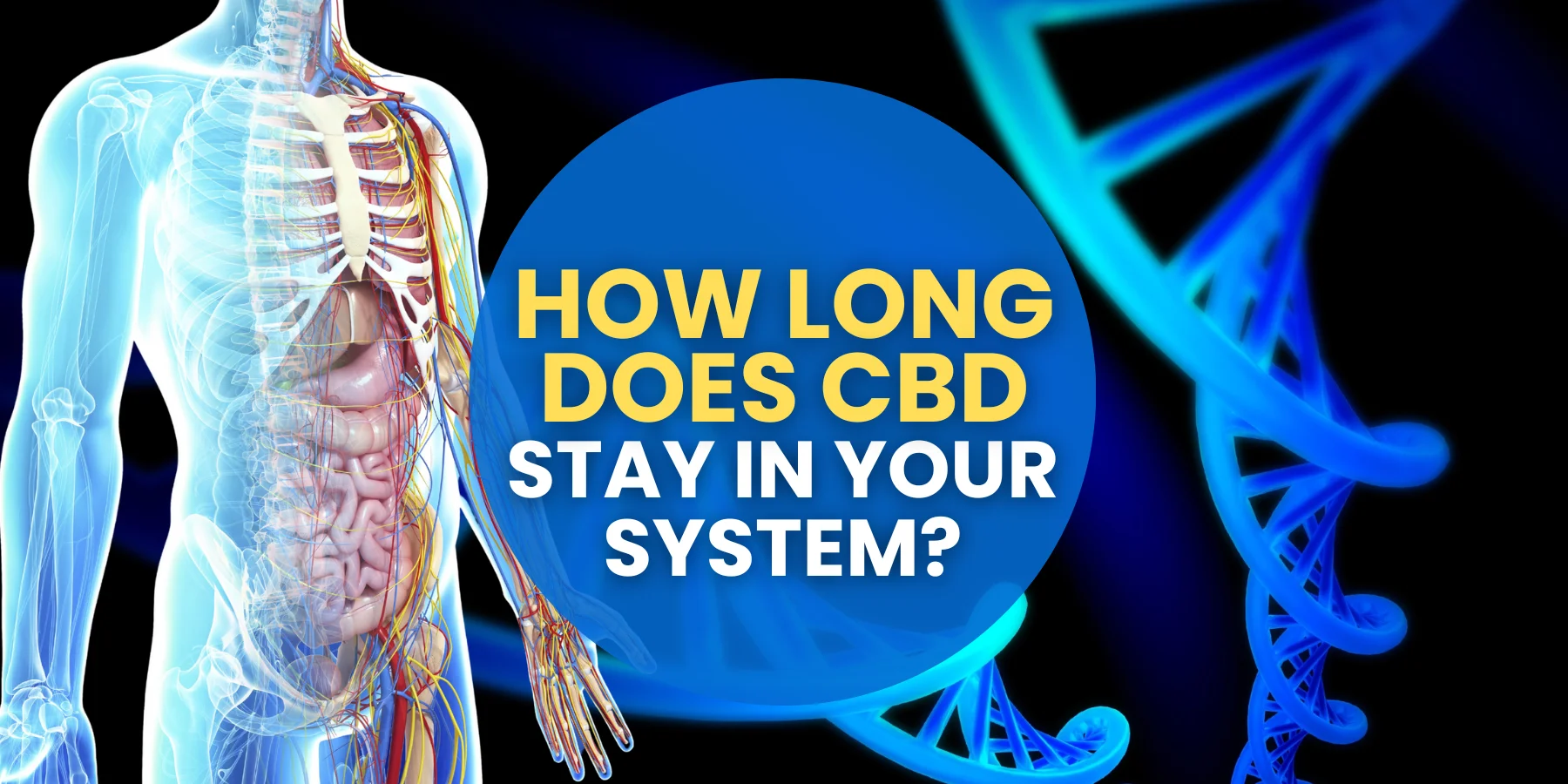If you’ve recently started using CBD products—or you’re thinking about exploring this popular trend—you might wonder how long CBD products stay in your system. Understanding cannabidiol’s journey through your body can help manage expectations, particularly if you’re concerned about potential drug tests or other personal reasons. It’s also important to confirm whether CBD legal considerations align with your local laws before incorporating it into your routine. CBD oil, short for cannabidiol, is readily available across the United States and is often embraced for holistic lifestyle purposes—but exactly how long does it linger after you stop taking it?
Key Takeaways
- CBD usually sticks around in your system for about 1 day to 2 weeks after you use it. How long really varies from person to person.
- Things like how much you take, how often you use it, your body type, what you eat, and how fast your metabolism works can all influence how quickly CBD leaves your system.
- Most drug tests don’t specifically check for CBD, but some CBD edibles or full spectrum products might have tiny traces of THC in them.
- Getting to know the different types of CBD, like full-spectrum, broad-spectrum, and isolate, can help you avoid accidental THC exposure.
- Simple things like drinking enough water, working out, and eating healthy meals might help your body process CBD a bit faster.
- If you have any worries about how CBD could affect you or drug testing, it’s a good idea to have a chat with a doctor or pharmacist for answers.
- Always stick to buying top-notch CBD from reliable brands that show independent lab results so you know what you’re getting.
How Long Does CBD Stay in Your System?
CBD is gaining popularity across America as a versatile wellness supplement. Though it doesn’t intoxicate like THC (tetrahydrocannabinol), many people wonder: Does CBD hang around in the body after it’s delivered its calming or balancing benefits? To fully understand how CBD moves through your system and how much stays lingered—let’s consider what science and research tell us, as well as the variables impacting this process.
Factors That Influence CBD Retention in Your System
Everyone is unique—what stays in one person’s system for days may clear within hours for another individual. Several factors directly influence how fast or slow CBD is metabolized and eliminated by your body. Your CBD dosage significantly impacts how long CBD stays in the system, as higher doses naturally take longer to metabolize and eliminate.
Dosage and Frequency of Use
Naturally, the more CBD you consume, the longer it can take for your body to clear it—and, in the case of full-spectrum products, minimize any detectable THC metabolites during routine testing. If you’re an occasional user—say you took a CBD gummy during a particularly stressful day—CBD might leave your system within about 1-3 days. However, daily or frequent usage builds CBD levels over time, resulting in longer detection windows. Regular users might see CBD remain detectable up to 7–14 days, depending upon dosage and pattern. Methods such as inhaled CBD are metabolized quickly, often clearing within 1–2 days.
Body Weight and Composition
Your body’s makeup also matters. CBD and other cannabinoids are fat-soluble compounds. This means they bond easily to fatty tissues in our bodies. Usually, people with higher body fat percentages may retain CBD longer than leaner individuals. Metabolism speed is another individual factor: high-metabolism individuals often clear substances faster, which may also influence how quickly CBD effects, including those relevant to mental health, fade from the body. The retention window can also be influenced by whether the CBD product contains trace amounts of THC, which may linger for longer periods.
Diet and Hydration Levels
Hydration plays a role in the body’s metabolic processes, including how efficiently substances are excreted. Eating fiber-rich and nutritious meals might support faster digestion, possibly speeding up CBD elimination—though the effects here are subtle rather than dramatic. Conversely, poor diet, heavy alcohol consumption, or dehydration may slow clearance from your system.
Why the Method of Consumption Matters
When it comes to CBD consumption, the method you choose can make all the difference. From efficiency to impact, how something is consumed can influence the overall experience and outcomes.
Edibles, Capsules, Oils, Inhalation, or Topicals
Another huge influencer of CBD duration is how you consume it:
- CBD oils or tinctures, taken sublingually (under the tongue), absorb quickly into your bloodstream. The CBD concentration in oils is often higher, making them a potent option for faster results. This method typically delivers effects within 15-45 minutes, with CBD staying in the system up to 2–5 days for occasional users.
- CBD edibles and pills like CBD gummies and CBD capsules pass through your digestive tract first, making the CBD absorption slower over several hours. Edible CBD products are ideal for those seeking more gradual, long-lasting relief due to their slow-release nature as they process through the digestive system. They typically take 1–2 hours to kick in and may remain in your body for several days or more, especially with regular usage.
- Inhaling CBD through vaping CBD or smoking allows instant absorption via the lungs, causing immediate effects and rapid clearance, usually within 1–2 days.
- Topicals, applied directly to the skin. CBD interacts with localized cannabinoid receptors in the skin rather than entering the bloodstream. This means CBD topicals, such as creams or balms, do not produce systemic effects and have minimal penetration beyond the application area. However, their effects can last 6–12 hours, offering localized relief until reapplication is needed..
What Does Research Say About CBD Elimination?
Researchers suggest most CBD users have CBD metabolites clear within 2–5 days for single-time users, while heavier, regular users might take several weeks. Studies indicate that even small amounts of THC could potentially result in a positive drug test, so choosing isolates or broad-spectrum CBD is often safer for sensitive users. One published study, for example, evaluated participants who regularly consumed high-dose CBD for several weeks. After discontinuing CBD use, cannabidiol remained detectable in blood plasma 7 days after cessation, with concentrations dropping steadily over time, usually undetectable within roughly one to two weeks.
There’s still much to explore, and scientists continue to study the exact timeframe and influential variables. But current data indicate a potential window of detection from one or two days (for occasional, small-dose use) to approximately two weeks (for frequent, heavier usage).
CBD and Drug Testing: Setting the Record Straight
While most standard drug screenings focus on THC, there’s a possibility that a detailed blood test might detect cannabis-derived compounds like THC or even trace amounts from some CBD products. Full-spectrum CBD products contain small permissible amounts of THC (by federal regulations less than 0.3 THC limit), capable of accumulating and occasionally showing on a drug test—though rare. CBD isolate and broad-spectrum CBD products typically do not contain detectable THC levels, significantly reducing the risk of unintended detection on standard drug screens.
To minimize concerns:
- Hemp derived CBD can significantly reduce risks when purchased from reputable, third-party lab-tested CBD brands.
- Opt for isolated or broad-spectrum CBD products if THC is a concern, as broad-spectrum retains additional cannabinoids while avoiding the risk of THC accumulation.
- If you’re extremely cautious, abstain from CBD intake several days or even weeks before testing.
Practical Tips to Help Your Body Clear CBD Faster
Planning a break from CBD for any reason? Here are some gentle ways to support your body’s natural processes in clearing cannabidiol:
- Stay well-hydrated daily with plenty of water. Using pure CBD products may also help minimize potential concerns with THC clearance.
- Exercise regularly with moderate intensity (brisk walking or yoga can enhance metabolism).
- Maintain a balanced diet loaded with fiber-rich vegetables and whole grains.
- Avoid alcohol and processed foods that slow digestion.
- Prioritize restful sleep to let your body efficiently restore and cleanse itself naturally.
Putting It All Together: The Bottom Line
Knowing how long CBD sticks around can really help put your mind at ease, make smarter choices, and keep your expectations in check for your CBD experience. Keep in mind that things like how often you use CBD, your body type, how you take it, and your general lifestyle all play a role in how fast it leaves your system.
If you’re worried about CBD showing up in tests or how it fits into your daily life, chatting with a healthcare pro is a smart move. Getting reliable tests and personalized tips from experts can really help you on your wellness journey using CBD and other natural supplements.
We hope this guide answered some of your questions! Want to know more about CBD or wellness? Check out our other detailed guides, or talk to a reliable specialist to find the CBD fit that works best for you.
Have you noticed how fast (or slow) CBD goes away from your system? Share your thoughts below, we’d love to hear what you think! Got questions? Feel free to ask—let’s keep chatting!


